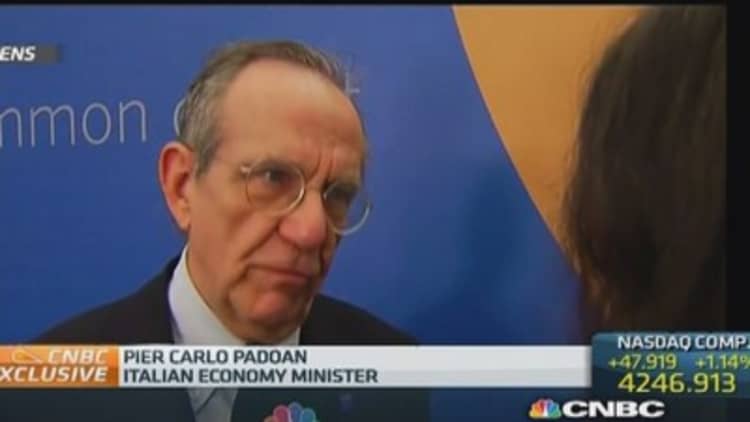Factory activity in the euro zone expanded for the ninth straight month in March, albeit at a slower pace than seen last month as the peripheral nations balanced out the slowing core nations, as unemployment remained close to its record high.
Unemployment in the euro area remained stuck at 11.9 percent in February, hardly moving from this time last year, when the figure was 12 percent, according to the European Statistics Office, Eurostat.

Joblessness in the region has been stable since October 2013 following downward revisions of the last few months. Manufacturing and unemployment saw divergence, as growth picked up factory activity in France and Italy while joblessness increased slightly.
Eurostat estimates that 18.965 million men and 25.920 million women were unemployed in the euro area in February. The lowest unemployment rates were recorded in Austria, with 4.8 percent, followed by Germany at 5.1 percent and Luxembourg (6.1 percent). The highest was recorded in Greece and Spain with 27.5 and 25.6 percent respectively.
Bill Adams, senior international economist for PNC Financial Services Group said the decline in the reported unemployment rate in February from January's original release is "methodological noise".
Read MoreEuro zone inflation slides, fueling deflation fears
"The key message is that a year into the recovery, the unemployment rate in the euro zone is still near a record high. In the country-by-country breakdown, the unemployment rate fell in Spain in February, was unchanged in Germany, and rose in France and Italy from January," said Adams.
Speaking at an informal meeting of euro zone finance ministers on Tuesday, Italy's finance minister called for Europe to pay closer attention to unemployment.
Italy's unemployment rate for February rose to 13 percent, from 12.9 percent the month before. Youth unemployment came in at 42.3 percent, secondly only to Spain.
"The issue is that all members of the EU and single currency need to look much more strongly at growth and employment issues," Pier Carlo Padoan told CNBC.
His comments come after Italy's new Prime Minister Matteo Renzi called for political measures to enhance growth and job creation in the country, and detailed a rapid schedule of targets for reforms.
"We are going to finance tax cuts with permanent spending cuts through a new approach to public spending," Padoan said, adding that the country would meet its reform targets.
Manufacturing sector
The manufacturing purchasing managers' index, compiled by data company Markit, hit 53.0 in March, down from 53.2 the previous month, but still above the crucial 50 mark that signals growth. The figure is also below the January high of 54.
The final estimate of a poll from purchasing managers confirmed that the euro zone periphery manufacturers eked out faster growth, contributing to the currency bloc's recovery.
The figure remained unchanged from the flash estimate earlier this month and was down from the two-and-a-half year high reached in January this year.
Read MoreFrance on the mend as German firms take a breather
March saw the periphery take the lead in the current upturn, with faster growth in Ireland, Spain and Italy, while stalwarts Germany, the Netherlands and Austria lost steam.
Manufacturing in Spain hit a stellar 47-month high, followed by a 35-month high in Ireland. In France, the manufacturing sector sprang to life in March, rising to a 33-month high, at 52.1, up from 49.7 in February.
A key driver of France's upbeat reading was a return to growth of new orders. For the first time in six months incoming new work rose and the rate of expansion was at a 34-month high.
"Despite having cooled slightly in March, the euro area manufacturing sector continues to enjoy its best spell of growth since early-2011," said chief economist at Markit, Chris Williamson.
"The rate of output growth remains encouragingly robust, with the survey indicating that production rose by around 1 percent in the first quarter. That means the goods producing sector is on course to provide a meaningful boost to the overall economy in the first three months of the year," he said.
Read MoreECB to get drastic? QE could be on the table
Greece edged back into contraction territory for the first time in three months reflecting sharp slowdowns in growth of output.
Greece and the Netherlands were the only nations to report manufacturing job losses during in March. Ireland registered a solid increase in staffing levels, while jobs rose only marginally across the remaining nations surveyed.



